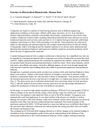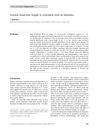 3 citations,
May 2018 in “European Journal of Dermatology”
3 citations,
May 2018 in “European Journal of Dermatology” Photodynamic therapy may not work for erythroplasia of Queyrat and could lead to invasive squamous cell carcinoma.
 35 citations,
August 2004 in “Epilepsy & behavior”
35 citations,
August 2004 in “Epilepsy & behavior” Extended-release divalproex is better tolerated and more effective for seizures and psychiatric symptoms than delayed-release divalproex, but doesn't reduce hair loss.
[object Object]  May 2012 in “Journal of Clinical Oncology”
May 2012 in “Journal of Clinical Oncology” Taking 5-alpha reductase inhibitors might be linked to breast cancer in men.

The document listed various medical job opportunities with competitive benefits and living conditions.
 3 citations,
August 2011 in “Current Psychiatry Reviews”
3 citations,
August 2011 in “Current Psychiatry Reviews” Family-based treatment is the best outpatient care for stable teens with anorexia, and more research is needed on medication and treatment effectiveness for young people with eating disorders.
 July 2011 in “Microscopy and microanalysis”
July 2011 in “Microscopy and microanalysis” Human hair's structure makes it tough and resistant to breaking.
[object Object]  1 citations,
March 2022 in “Daehanhanuihakoeji”
1 citations,
March 2022 in “Daehanhanuihakoeji” Artemisia sieversiana extract may help prevent hair loss and promote hair growth.
 4 citations,
June 2019 in “International Journal of Dermatology and Venereology”
4 citations,
June 2019 in “International Journal of Dermatology and Venereology” Some skin diseases may indicate a higher risk of metabolic syndrome and related health issues.
 25 citations,
August 2016 in “Journal of Cosmetic Dermatology”
25 citations,
August 2016 in “Journal of Cosmetic Dermatology” The marine complex supplement significantly improved hair growth in men with thinning hair without adverse effects.
 6 citations,
April 2010 in “Journal of Dermatological Science”
6 citations,
April 2010 in “Journal of Dermatological Science” Laminin-511 may help promote hair growth, while laminin-332 does not affect hair loss.
25 citations,
May 1972 in “Canadian journal of zoology” Black-tailed deer have four types of pelages and molt twice a year.
 1 citations,
July 2023 in “Nature communications”
1 citations,
July 2023 in “Nature communications” MOF controls key genes for skin development by regulating mitochondrial and ciliary functions.
 July 2023 in “International Journal of Endocrinology”
July 2023 in “International Journal of Endocrinology” Centratherum anthelminticum seed extract effectively treats Polycystic Ovary Syndrome in rats.
 4 citations,
November 2004 in “Clinical and Experimental Dermatology”
4 citations,
November 2004 in “Clinical and Experimental Dermatology” Hair length and thickness are related, with thickness peaking at about a quarter of the hair's maximum length.
 January 2023 in “Discovery medicine”
January 2023 in “Discovery medicine” Cepharanthine helps reduce cell aging caused by the cancer drug Doxorubicin by boosting cell cleanup processes.
 56 citations,
January 2019 in “Lancet”
56 citations,
January 2019 in “Lancet” JAK inhibitors help regrow hair in alopecia areata patients, improving their quality of life.
 September 2018 in “Fertility and Sterility”
September 2018 in “Fertility and Sterility” High levels of testosterone and anti-Müllerian hormone before pregnancy are linked to a higher risk of newborns needing intensive care.
 July 2023 in “The Egyptian Journal of Hospital Medicine ”
July 2023 in “The Egyptian Journal of Hospital Medicine ” The conclusion is that emotional support and a variety of treatments are important for alopecia areata, but more research is needed.
 1 citations,
September 2020 in “Journal of Dermatological Science”
1 citations,
September 2020 in “Journal of Dermatological Science” The gene LRRC15 is more active in balding areas of the scalp compared to non-balding areas.
1 citations,
December 2022 in “Pharmaceutics” Finasteride-loaded microemulsions can effectively enhance skin delivery for treating hair loss.
 15 citations,
May 2019 in “PLOS ONE”
15 citations,
May 2019 in “PLOS ONE” Substances from dental stem cells might help treat hair loss.
January 2019 in “Egyptian Journal of Dermatology and Venereology /Egyptian Journal of Dermatology and Venerology” Mixing calcipotriol with a steroid is almost as effective as using a steroid alone for alopecia areata and has fewer side effects.
 3 citations,
January 2021 in “Journal of The American Academy of Dermatology”
3 citations,
January 2021 in “Journal of The American Academy of Dermatology” Different types of atopic dermatitis were linked to specific genetic and immune changes, suggesting that severe cases might need stronger immune-targeting treatments.
 April 2016 in “JAMA Dermatology”
April 2016 in “JAMA Dermatology” Acne is not a key diagnostic feature for PCOS, postadolescent men with acne may have insulin resistance, melanoma patients often have few moles, tumor size in CSCC indicates higher risk of serious outcomes, and hidradenitis suppurativa is linked to higher risk of heart problems and death.
 2 citations,
April 2016 in “The Journal of Urology”
2 citations,
April 2016 in “The Journal of Urology” Finasteride 1mg linked to diverse symptoms; other treatments improve erectile function in rats.
1 citations,
January 2019 in “Indian journal of paediatric dermatology” Kids with alopecia areata had lower vitamin D levels than healthy kids.
 3 citations,
January 2019 in “Annals of dermatology/Annals of Dermatology”
3 citations,
January 2019 in “Annals of dermatology/Annals of Dermatology” Hydroxychloroquine effectively treated twenty-nail dystrophy in a patient with alopecia areata.
 April 2012 in “Journal of the American Academy of Dermatology”
April 2012 in “Journal of the American Academy of Dermatology” People with androgenetic alopecia may have a higher risk of heart problems compared to those with alopecia areata or healthy individuals.

People with psoriasis have more health problems, including autoimmune diseases, than those without it.
15 citations,
January 2022 in “Immune Network/Immune network” New targeted immunotherapies are improving treatment for inflammatory skin diseases.

























